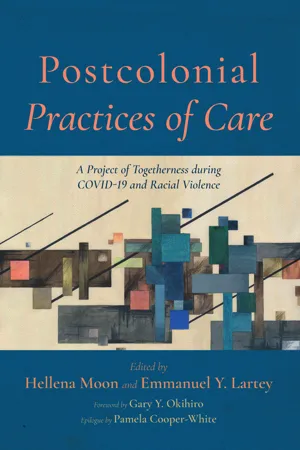
Postcolonial Practices of Care
A Project of Togetherness during Covid-19 and Racial Violence
- 316 pages
- English
- ePUB (mobile friendly)
- Available on iOS & Android
Postcolonial Practices of Care
A Project of Togetherness during Covid-19 and Racial Violence
About this book
This anthology seeks to theorize a method of a radical, decolonial spiritual-care paradigm that can chart a new course in defining--or reframing--what is "spiritual, " what is theological, and what is "care." Postcolonial Practices of Care presents voices of educators, chaplains, students, human-rights and disability activists, and other professionals to highlight the problems of disciplinary divides and binaries--such as pastoral/spiritual or ordinary/sacred. In focusing on the practices of care during the pandemic, the editors see their book as contributing to ongoing paradigm shifts and the importance of decoloniality as a method in the field of pastoral care.The praxis of spiritual care addresses--and interrogates--the history of spiritual violence and its imbrication with modernity/coloniality, colonialism, racial capitalism, neoliberalism, and (conscious and unconscious) white Christian supremacy that constructed not only the pastoral and the spiritual but also its divide: the pastoral/spiritual. Such a framework focuses on "religious" difference without probing or critiquing how those differences have reified hierarchies of superiority or sustained ideologies of Euro-centric monocultural ethnocentrism. We want to emphasize the shared practices that bring us together as human beings on Earth rather than to prove we are better, or more unique, than one another.
Frequently asked questions
- Essential is ideal for learners and professionals who enjoy exploring a wide range of subjects. Access the Essential Library with 800,000+ trusted titles and best-sellers across business, personal growth, and the humanities. Includes unlimited reading time and Standard Read Aloud voice.
- Complete: Perfect for advanced learners and researchers needing full, unrestricted access. Unlock 1.4M+ books across hundreds of subjects, including academic and specialized titles. The Complete Plan also includes advanced features like Premium Read Aloud and Research Assistant.
Please note we cannot support devices running on iOS 13 and Android 7 or earlier. Learn more about using the app.
Information
Table of contents
- Title Page
- Contributors
- Foreword
- Acknowledgments
- Introduction
- Part One: Decoloniality & Repair of the Harm
- Part Two: Transgressive Boundaries, Bodies, & Liberative Practices of Care
- Part Three: Fugitivity & Escape in Our Heterotopic World
- Part Four: Conversations, Reflections, & Poetry: “Study” from the Community
- Epilogue
- Bibliography